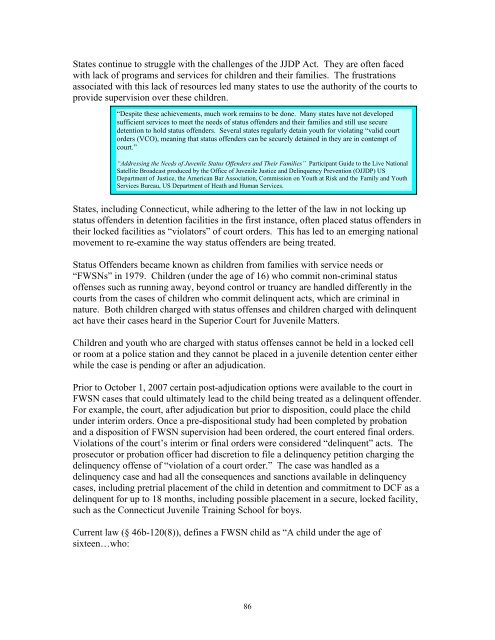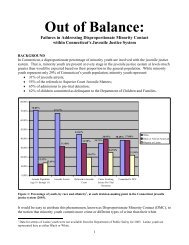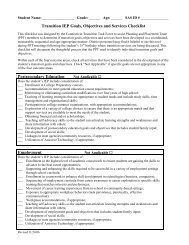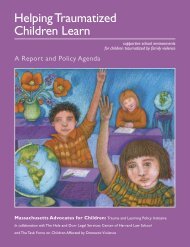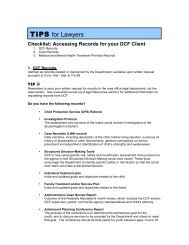FWSN-advisorybd-repo.. - The Connecticut Juvenile Justice Alliance
FWSN-advisorybd-repo.. - The Connecticut Juvenile Justice Alliance
FWSN-advisorybd-repo.. - The Connecticut Juvenile Justice Alliance
Create successful ePaper yourself
Turn your PDF publications into a flip-book with our unique Google optimized e-Paper software.
States continue to struggle with the challenges of the JJDP Act. <strong>The</strong>y are often faced<br />
with lack of programs and services for children and their families. <strong>The</strong> frustrations<br />
associated with this lack of resources led many states to use the authority of the courts to<br />
provide supervision over these children.<br />
“Despite these achievements, much work remains to be done. Many states have not developed<br />
sufficient services to meet the needs of status offenders and their families and still use secure<br />
detention to hold status offenders. Several states regularly detain youth for violating “valid court<br />
orders (VCO), meaning that status offenders can be securely detained in they are in contempt of<br />
court.”<br />
“Addressing the Needs of <strong>Juvenile</strong> Status Offenders and <strong>The</strong>ir Families” Participant Guide to the Live National<br />
Satellite Broadcast produced by the Office of <strong>Juvenile</strong> <strong>Justice</strong> and Delinquency Prevention (OJJDP) US<br />
Department of <strong>Justice</strong>, the American Bar Association, Commission on Youth at Risk and the Family and Youth<br />
Services Bureau, US Department of Heath and Human Services.<br />
States, including <strong>Connecticut</strong>, while adhering to the letter of the law in not locking up<br />
status offenders in detention facilities in the first instance, often placed status offenders in<br />
their locked facilities as “violators” of court orders. This has led to an emerging national<br />
movement to re-examine the way status offenders are being treated.<br />
Status Offenders became known as children from families with service needs or<br />
“<strong>FWSN</strong>s” in 1979. Children (under the age of 16) who commit non-criminal status<br />
offenses such as running away, beyond control or truancy are handled differently in the<br />
courts from the cases of children who commit delinquent acts, which are criminal in<br />
nature. Both children charged with status offenses and children charged with delinquent<br />
act have their cases heard in the Superior Court for <strong>Juvenile</strong> Matters.<br />
Children and youth who are charged with status offenses cannot be held in a locked cell<br />
or room at a police station and they cannot be placed in a juvenile detention center either<br />
while the case is pending or after an adjudication.<br />
Prior to October 1, 2007 certain post-adjudication options were available to the court in<br />
<strong>FWSN</strong> cases that could ultimately lead to the child being treated as a delinquent offender.<br />
For example, the court, after adjudication but prior to disposition, could place the child<br />
under interim orders. Once a pre-dispositional study had been completed by probation<br />
and a disposition of <strong>FWSN</strong> supervision had been ordered, the court entered final orders.<br />
Violations of the court’s interim or final orders were considered “delinquent” acts. <strong>The</strong><br />
prosecutor or probation officer had discretion to file a delinquency petition charging the<br />
delinquency offense of “violation of a court order.” <strong>The</strong> case was handled as a<br />
delinquency case and had all the consequences and sanctions available in delinquency<br />
cases, including pretrial placement of the child in detention and commitment to DCF as a<br />
delinquent for up to 18 months, including possible placement in a secure, locked facility,<br />
such as the <strong>Connecticut</strong> <strong>Juvenile</strong> Training School for boys.<br />
Current law (§ 46b-120(8)), defines a <strong>FWSN</strong> child as “A child under the age of<br />
sixteen…who:<br />
86


